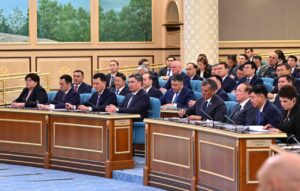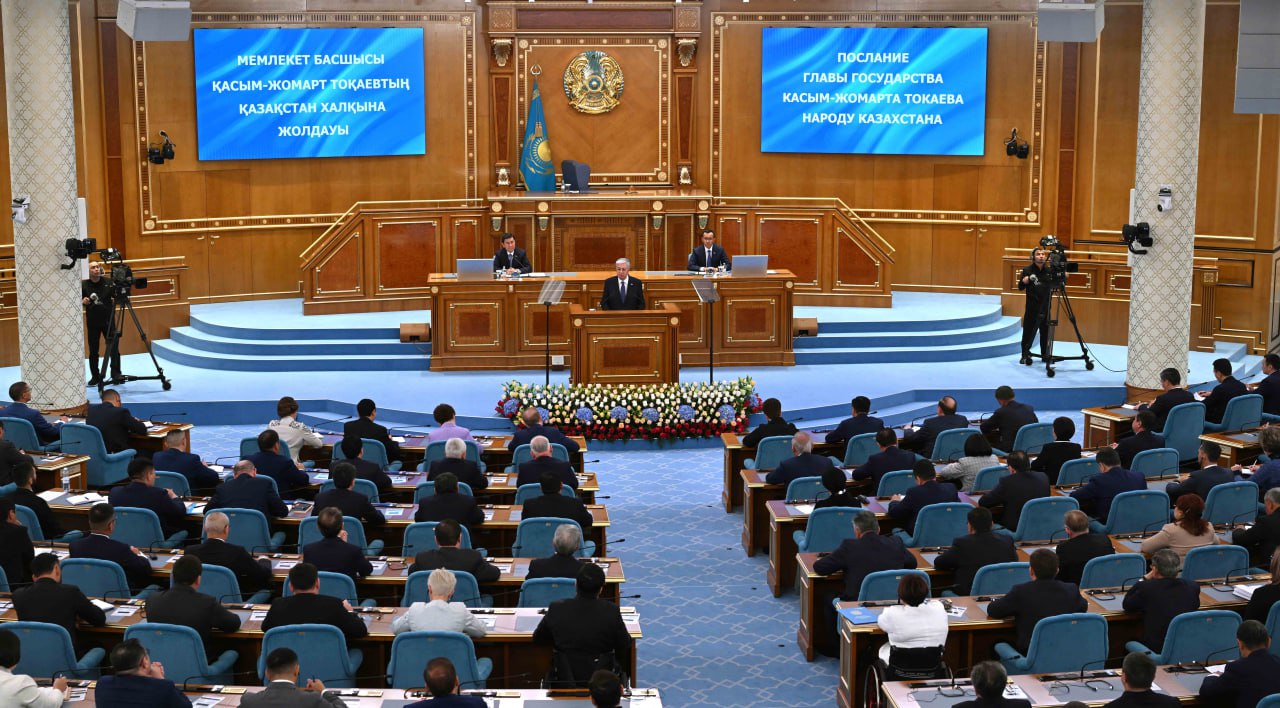Overview
On September 2, 2024, President Kassym-Jomart Tokayev delivered his annual state-of-the-nation address to Kazakh citizens at a joint meeting of Parliament. He focused on Kazakhstan’s economic and social development, stating that the State’s primary goals are sustainable socio-economic progress, unlocking citizens’ potential, and improving national well-being.
This factsheet outlines the key priorities and tasks outlined by President Tokayev.
Referendum on the construction of a nuclear power plant
- A nationwide referendum on the construction of a nuclear power plant will be held on October 6, 2024, marking a significant step in fostering a new socio-political culture and exemplifying the “listening state” concept.

Recent Accomplishments
- During the recent session, 102 laws were passed, including significant legislation on public oversight, combating human trafficking, science and technology policy, and thermal energy.
- Special attention was given to social issues, particularly child protection, with new laws providing financial support for children from the National Fund, imposing administrative penalties for involving minors in gambling, and strengthening punishments for violence against minors.
- A law aimed at ensuring child safety and preventing crimes against women and children has come into force.
- Addressing the issue of widespread consumer debt, new laws were introduced to mitigate its societal risks.
- Systematic efforts were made to improve the well-being of citizens, contributing to the implementation of the “listening state” concept.
- Kazakhstan is undergoing major political reforms, transforming public consciousness, legal culture, and social values, aligned with the goal of building a “Just Kazakhstan.”
- Despite geopolitical tensions, the country is committed to a peaceful, evolutionary path and economic diversification.
- Inflation has significantly decreased, international reserves exceed $100 billion, and manufacturing outpaces mining growth.
Key Tasks Set by President Tokayev
- Address imbalances between monetary and fiscal policies:
The President directed the government to take effective measures for efficient budget use, strict control of expenditures, and improving inter-budgetary relations. In particular:
- The focus is on restructuring the economy, boosting citizen incomes, reducing inequality, and strengthening the middle class, with efficiency as a key criterion.
- Encourage banks to invest more in the economy and ensure fair taxation aligned with their profits, especially given past state support.
- Develop a new banking law to foster economic activity and fintech growth.
- Address the issue of underperforming revenue collection in the national budget.
- Attracting private investment through a stable, business-friendly tax policy is crucial.
- Address the high level of the shadow economy with targeted measures, including securing border customs posts.
- Tax reforms:
- A new Tax Code is needed to establish a simpler, more transparent system.
- Optimise tax regimes without disadvantaging entrepreneurs, such as the successful introduction of the retail tax.
- Comprehensive digitalisation of tax administration to reduce corruption and increase transparency.
- Establish differentiated personal income tax rates and move away from punitive tax administration.
- Increase the threshold for tax debt notifications without forced collection.
- Eliminate scheduled tax audits by improving risk management.
- Enhance the effectiveness of tax incentives, retaining those that truly stimulate business.
- Enhancing the investment climate and business conditions:
- Increase direct investments in the economy, with a focus on improving public-private partnership projects.
- Preferences for investors focused on production development, including one-time deductions for construction, acquisition, modernization, and reconstruction of assets.
- The government must increase the share of medium-sized businesses in the economy to 15% by 2029, up from the current 7%.
- Deregulation efforts have removed over 10,000 unnecessary business restrictions, but issues with excessive government oversight persist.
- A review of over 100 business support measures will be conducted to assess their effectiveness, and a clear, unified list of preferences and benefits for businesses will be created.
- Information on returned state assets and their use must be systematically organised.
- Capital amnesty should be tied to reinvesting in Kazakhstan’s economy, with entrepreneurs encouraged to contribute to social infrastructure.
- Agriculture
- The key task is to gradually shift from direct subsidies in agriculture to providing accessible credit, ensuring all allocated funds are used effectively.
- Doubling the funding for spring fieldwork in 2024, with 70% of agricultural financing provided by the state.
- Consideration of a new tool, “commodity credit,” within the “Aul Amanaty” project.
- Unlock the country’s industrial potential:
- Focus on 17 major projects that prioritise advanced processing and the use of domestic raw materials and components.
- The development of the petrochemical industry remains a priority, with major projects underway in polypropylene and polyethylene production.
- Gas infrastructure:
- Ensuring gas supply for the population and economy is a key government task.
- The government is tasked with accelerating the construction of gas processing plants in Zhanaozen, Kashagan, and Karachaganak.
- Completion of the modernisation of over 800 kilometres of the “Central Asia – Center” gas pipeline.
- Development of new gas reserves with an annual production volume of one billion cubic metres.
- Address urgent infrastructure issues, particularly in the energy sector and utilities:
The State continues to actively develop transport, energy, water, and social infrastructure. In particular:
- Energy sector
- A national project for modernising the energy and utility sectors must be approved by year-end.
- Clear and long-term tariff policy planning is crucial for attracting significant investments into the sector.
- Transport and logistics sector
- Developing the transport and logistics sector is a strategic priority for Kazakhstan.
- The condition of highways is a pressing issue, with an unprecedented 12,000 km of roads being repaired or constructed this year.
- The mid-level road repair programme is crucial, covering 2,500 km of interregional roads, and should be expanded to at least 10,000 km nationwide.
- Developing air hubs is a crucial task, with the potential to double the annual processing of 150,000 tons of air cargo in the next four years
- Digitalisation
- Kazakhstan must strengthen its digitalisation efforts, with a focus on integrating artificial intelligence into the e-government platform.
- A National AI Centre in Astana will be launched next year.
- The completion of the fibre-optic line across the Caspian Sea by 2025 is crucial for Kazakhstan’s digital infrastructure.
- Water sector
- Necessary to create water reserves from floodwaters for agricultural use, repairing and modernising hydrological stations.
- Strengthen the country’s workforce:
- The government has begun internationalising higher education by attracting 23 prominent foreign universities.
- The year 2025 will be designated as the “Year of Vocational Professions.”
- New honorary titles for engineers, geologists, transportation and agricultural workers, and scientists will be introduced.
- The “Comfortable School” national project aims to build 217 modern schools by the end of 2025. Additionally, nearly 1,300 schools will be renovated within three years.
- Improve public health and revamp the social support system:
- A unified package of basic state healthcare services should be developed, balanced with the budget’s capabilities.
- A single state medical information system should replace the current fragmented programs and databases.
- The development of healthcare should leverage public-private partnerships (PPP) more effectively.
- The government is tasked with implementing a “social wallet” mechanism by next year to ensure that aid is targeted at those who genuinely need it.
- Improve the environmental situation and foster a culture of environmental stewardship:
- The government is tasked with implementing advanced technologies and establishing a modern emissions monitoring system.
- Reforestation is crucial for maintaining ecological balance and will continue. Increasing forest areas should become a national movement.
- The nationwide environmental campaign “Taza Qazaqstan” should continue year-round. Regional leaders (akims) are directly responsible for the effective implementation of Taza Qazaqstan.
- Enhance the effectiveness of public administration:
- Since 2021, around 2,500 village akims, representing 90% of all rural leaders, have been elected. The remaining villages will hold elections as current terms end.
- Last autumn, elections for district and city akims of regional significance were held for the first time. A decision was made to fully transition to this new system starting next year. All district and city akims will be elected directly as their terms expire.
- Political reforms will continue as needed to support the development of the state, ensuring ongoing progress.
- Implementing effective measures to ensure the efficient use of budget funds, with strict control over expenditures.
- Developing a unified ecosystem for handling public inquiries, identifying citizens’ current needs and expectations.
- Promote law and order:
- A key goal is to make Kazakhstan a comfortable and safe place to live.
- Through comprehensive reforms, Kazakhstan has significantly expanded freedom of expression.
- Socio-economic transformations and measures to protect human rights are aimed at building a just society. Reforms will continue.
- Combating drug abuse is a critical task.
- The “Qaryszsyz Qogam” project, initiated to enhance citizens’ financial literacy, reached 65,000 people last year and will be expanded this year.
- A new Law on Crime Prevention is being developed.
- Ensuring discipline in the military is crucial for young soldiers to fulfil their duties effectively.
On Kazakhstan’s foreign policy
- Kazakhstan maintains a peaceful and balanced foreign policy, focused on strengthening sovereignty, protecting citizens abroad, promoting national interests, and attracting investments.
- The country is committed to multilateral cooperation in line with the UN Charter, playing an active role in international security and stability.
- Kazakhstan supports UN and other international organisations’ efforts to combat terrorism, extremism, illegal migration, climate change, and other global threats.
- Kazakhstan supports UN peacekeeping activities and disarmament initiatives and advocates for the resolution of armed conflicts through diplomatic means.
- Kazakhstan has hosted significant international events in Astana, including summits of the Conference on Interaction and Confidence-Building Measures in Asia, the Commonwealth of Independent States, the Shanghai Cooperation Organisation, and the Organisation of Turkic States.


